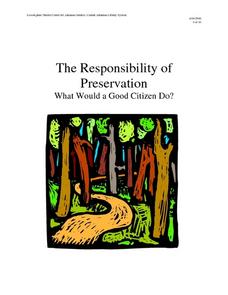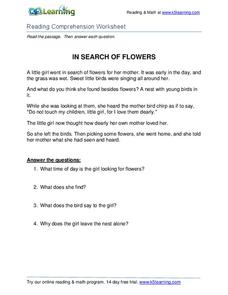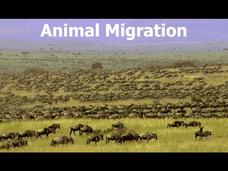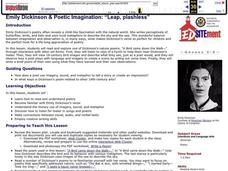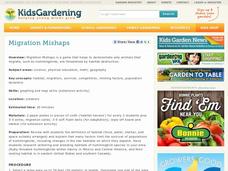Curated OER
The Responsibility of Preservation
Upper elementary and middle schoolers study the case of the ivory-billed woodpecker, a bird that was once-thought to be extinct. Learners explore the responsibility of people to preserve habitats, and take care of the animals who live in...
Curated OER
Where Has It Been? Tracking the Ivory-Billed Woodpecker
By studying the assumed extinction, and subsequent rediscovery of the Ivory-billed Woodpecker, learners use maps and come up with a scenario for the rediscovery of the bird. This incredibly thorough lesson plan is chock-full of...
Curated OER
1st Grade Science Jeopardy
This is one of the best Jeopardy-style presentations I've seen. Young scientists play a game whose categories include, Mammals, Reptiles, Fish, Birds, and Insects. One very nice component of this PowerPoint is that there is a review...
DK Publishing
Sorting Animals
How many legs does a lion have? What about a bird? How many legs does a snake have? A counting assignment prompts kindergartners to sort the animals by the amount of legs they have. After kids finish matching, they can color the animals...
National Geographic
Rescuing, Relocating, and Rehabilitating Wildlife
Bring up the Deepwater Horizon (BP) oil spill that occurred in the Gulf of Mexico in 2010. Display the colorful diagram of the coastal and marine organisms living in the area. Show a video about relocating the eggs of the Gulf's sea...
Virginia Department of Education
Cell Parts
What do a bird, an egg, a rabbit, and a toad all have in common? This fun-filled resource explains the similarities and differences between cells and how all cells are similar, yet all are different. Learners begin by depicting a...
LABScI
Projectiles: Target Practice
Angry Birds prepared them, but now pupils must prove their skills with projectiles! Scholars test different variables to determine which ones impact the distance the projectile flies. The experiment provides connections to kinetic and...
Polar Trec
Swan Savvy
Just like so many other birds, swans migrate during the cold winter months. Your class can gain a better understanding of migration and bird life as they act out some of the activities common to the tundra swan. They make a nest, sit on...
K5 Learning
In Search of Flowers
There's no love like a mother's adoration for her children. Second graders read a short story about a little girl's discovery of baby birds and their mother before answering four comprehension questions.
Curated OER
A Model for Natural Selection- Spaghetti Worms
Does the early bird really get the worm? If so, which color of worm does it prefer? In an exciting and easy week-long field investigation, young field biologists set up a one square meter feeding area for birds. If you have a webcam,...
University of Washington
Animal Migration
Here is a unique resource to use with middle and high schoolers that deals with animal migration. Viewers discover the reasons for, types of, and animals that practice this behavioral adaptation. Specific animals that are introduced...
Curated OER
"Leap, Plashless": Emily Dickinson & Poetic Imagination
Students read and explore one of Emily Dickinson's nature poems, "A Bird Came Down the Walk-" through interaction with a variety of art forms. Clips of a hymn to hear meter and the viewing of bird images exposes them to the language and...
National Park Service
Fitting In
Birds help other birds find food? Scholars are placed into one of five groups of different birds. Each group then "feeds" on letters of paper in a field and gather five pieces per person. As each group plays, more food is exposed,...
Curated OER
Water's Edge Café
Students observe water birds feeding at a local wetland, record what they see, and construct an appropriate menu for a "Waterfowl Cafe." They also play a "flocking" game.
Curated OER
English Expressions Quiz: Online
An online worksheet provides opportunities to assess comprehension of 10 common adages like "A bird in the hand is worth two in the bush" or "Variety is the spice of life." Learners complete a multiple choice quiz (and can check their...
Curated OER
Bats
Use Stellaluna by Janell Canon to discuss bats and other types of animals. Learners identify the differences between bats and birds, list the traits of mammals, create a Bat Facts game, and go on a written scavenger hunt. Fun,...
National Gardening Association
Migration Mishaps
Elementary ecologists pretend to be migratory hummingbirds. They fly between wintering and nesting grounds, trying to reach a habitat haven. In a musical-chair fashion, some birds will miss out, and are removed from the game. To further...
Curated OER
Animals Belong in Class
In this classifying animals activity, students use the information in the word bank to complete the T-Chart about mammals, birds, fish, reptiles, amphibians, and arthropods. Students write 10 answers.
Curated OER
Separate Vacations
Students plot the migration paths of birds using latitude and longitude data from a table.
Curated OER
Above, On, and Below
This boating picture is missing a few things! Scholars practice common prepositions and counting as they add details to a scene. They follow specific directions by drawing two birds above the boat, three fish below it, and two ducks on...
Southern Nevada Regional Professional Development Program
“Double Double Speak Speak”
Bilateral suborbital hematoma? Call an audible? 404? Have fun with “the twittering or warbling of birds,” or as 14th century French speakers would say, have fun with “jargon.” Groups match specialized jargon with plain speech, decode...
Berkshire Museum
Camouflage!: Collecting Data and Concealing Color
Help young scholars see the important role camouflage plays in the survival of animals with a fun science activity. Starting with an outdoor activity, children take on the role of hungry birds as they search for worms represented by...
National Wildlife Federation
Penguin Fun Facts
What's black and white and can dive up to 1,800 feet under water? That's right, penguins! Learn this and many other amazing facts about these unique birds with this handy reference sheet.
Prestwick House
Edith Hamilton’s Mythology
Where is the Oracle? Who brought fire from Olympus? What creature is half bird, half horse? Review details from famous Greek myths with a crossword puzzle that focuses on Edith Hamilton's Mythology.
Other popular searches
- Common Birds
- Tropical Birds
- Pet Birds
- Aquatic Birds
- Bird Migration
- Bird Beak Adaptation
- Flightless Birds
- Birds of Prey
- Bird Feeders
- Bird Adaptations
- Bird Nests
- Birds in Flight


